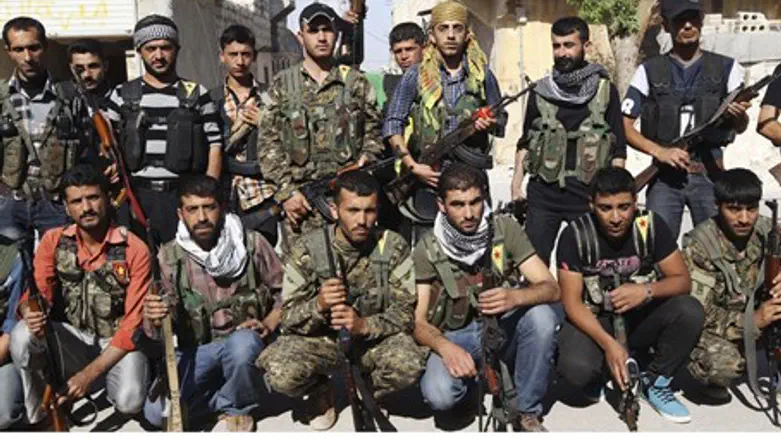
Syrian Kurdish rebels say they’ve captured the emir of the Islamic State of Iraq and Syria (ISIS) – the merged organization representing the jihadist Syrian rebel groups linked to Al Qaeda in Iraq.
A photo of the captured leader was posted on the Twitter mini-social networking site by the Kurdish People’s Defense Units (YPG), one of two Syrian Kurdish rebel groups which is preparing to declare autonomy in Syria.
Mutlu Civiroglue, a Washington-based Kurdish journalist, posted the announcement, along with the tweet: “Captured Amir of Islamic State of Iraq and the Levant (ISIS) Abu Musab is currently under YPG custody!
For more than a year, Syrian Kurds have been threatened by the Islamic extremists who long ago split from the more secular and so-called “moderate” National Syrian Council opposition forces.
The Kurdish National Council, a pro-opposition umbrella group of Syrian Kurdish parties, in January condemned what it said was an ongoing assault “against unarmed civilians” by jihadist insurgents on the city of Ras al-Ain along Syria’s border with Turkey. The Kurds called on the Free Syrian Army to “pressure these militants to stop this criminal war which is detrimental to the Syrian revolution,” AFP reported at the time.
Clashes between the Al Qaeda-linked jihadists and the Kurdish forces have continued for nearly a year, with ISIS having seized the town months ago.
Last week, Kurdish forces ousted them in a bloody battle, retaking parts of the city that for months had been under control of the Islamists who intended to declare an independent Islamic state in northern Syria, to be divided into emirates.
But YPG has been joined by PYD, Syria’s Kurdish Democratic Union Party, and Turkey’s Kurdistan Workers’ Party (PKK), which is listed as a terrorist organization both in Turkey and the United States. And linked together, the three are now planning to declare an autonomous Kurdish region in Syria, with a transitional administration for the next three months, to be followed by elections for a “permanent” government within six months.
PKK issues "final warning" to Ankara
Once that is accomplished, it is not clear what the implications will be for Turkey across the border. On Friday, Kurdish rebels issued what they said was a “final warning” to Ankara to take concrete steps to advance a peace settlement or be responsible for what follows after 30 years of tensions.
Jailed PKK leader Abdullah Ocalan was engaged in talks with the Turkish government last October to halt the conflict, which has so far left 40,000 dead and many more wounded in Turkey’s southeastern region, where there is a high Kurdish population.
Ocalan, known by his followers as APO, suffers from an eye ailment and is imprisoned on the island of Imrali, south of Istanbul.
Turkey is calling on the PKK to withdraw its fighters to the Iraqi Kurdistan side of the border before it will launch reforms set out under the talks. The PKK is demanding the AK Party-led government abolish an anti-terrorism law under which thousands were jailed for having links to the PKK, as well as grant full Kurdish-language education, and lower the threshold of votes needed by parties to enter the parliament.
The Kurdish nation is the largest people without a state in the Middle East. The region of Kurdistan is occupied by Syria, Turkey, Iraq and Iran, though the Kurdish Regional Government in northern Iraq has a large degree of autonomy from the Iraqi central government.
